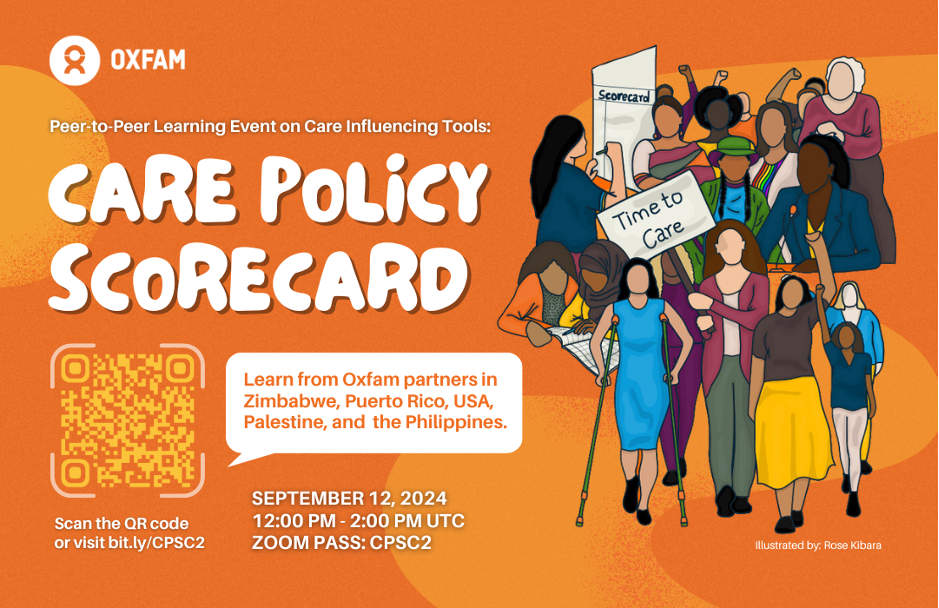From policy to practice: Unleashing the power of the Care Policy Scorecard
The Care Policy Scorecard, a powerful tool for measuring government progress on care policies, brought together care advocates from around the world for a transformative learning experience. The second1 Peer-to-Peer Learning Session, held virtually on 12 September 2024, provided a platform for sharing experiences, lessons learned, and best practices in utilizing this influencing instrument.
This learning session, which was organized by the Women’s Economic Empowerment Knowledge Hub (WEE KH) and the Women’s Economic Empowerment and Care (WE-Care) Program, aimed at sharing good practices and experiences, as well as surfacing lessons and challenges around implementing the Scorecard in different contexts. A total of 101 participants from 13 countries attended the learning session, representing Europe, Africa, North America, and the Asia-Pacific.

A tapestry of experiences
From the vibrant streets of Puerto Rico to the lush landscapes of Uganda, care advocates shared their diverse experiences in implementing the Care Policy Scorecard. Speakers used the opportunity to discuss the tool’s impact on advocacy, strategies for implementation, challenges faced, and plans for leveraging the Scorecard to influence policy and investments in the care economy.
Faith Sharleen Nkala from Bekezela Home-Based Care in Zimbabwe highlighted the Scorecard’s benefits in facilitating dialogue, providing evidence for advocacy, ensuring accountability, and prioritizing policy areas. According to Faith, it empowered community members to voice their concerns, leading to partnerships with governments for improving care services. In Palestine, Reem Asmar of the Rural Women Development Society described how the Scorecard provided a comprehensive and structured approach to evaluating and addressing deficiencies in government policies related to both paid and unpaid care work. To implement the Scorecard effectively, the Rural Women Development Society adjusted the tool to address local needs in Palestine. They also engaged with government officials, civil society, and community members to gain support and provide training on using the tool.
In the United States, Whitney Pesek from the National Women’s Law Center emphasized the Scorecard’s relevance in the current political landscape, providing a concrete framework for advocating for essential care policies. According to Whitney, tools like the Scorecard have likewise helped strengthen relationships with US agencies like the Department of Labor Women’s Bureau. Rosario Castro Bernardini of Oxfam America, meanwhile, shared insights on the collaborative process of developing the US Care Policy Scorecard, which incorporated diverse perspectives and addressed specific care realities within the country.
In Puerto Rico, the Care Policy Scorecard enabled Inter-Mujeres to develop recommendations for the government to address implementation issues and analyze Puerto Rican laws and regulations. For instance, Marilucy González Báez highlighted the Scorecard’s ability to identify policy gaps and inform recommendations for government and nongovernmental organizations, while Patricia Otón Olivieri discussed the strategies they adopted, including adding specific indicators and conducting qualitative research to understand the impact of government policies on care work. According to them, the Scorecard’s findings have been influential, as evidenced by increased discussions on care policies among various groups, including government candidates.
Susan Achen from the Uganda Women’s Network (UWONET) agreed with the other speakers and shared how the tool has helped raise awareness, build knowledge, and inform the development of care policies in Uganda. UWONET has used the Scorecard to assess government policies, advocate for support for unpaid caregivers, and develop a framework for women’s rights organizations to prioritize and invest in care within their own organizations.
Lastly, the speaker from the Philippines, who also closed the learning session, highlighted an innovative solution to implementing the Scorecard. Paulina Lawsin-Nayra of the Women Enablers Advocates and Volunteers for Empowering and Responsive Solutions emphasized the importance of customizing the Care Policy Scorecard to align with a social accountability approach. To achieve this, Paulina said it was crucial to gain buy-in from both government officials and community members. This involved training policymakers at the local level and strengthening care advocacy among civil society organizations and community care champions.
Challenges, solutions, and prospects
The journey of implementing the Care Policy Scorecard was not without its challenges. Speakers discussed the difficulties of gaining support from government officials, gathering comprehensive data, and ensuring the tool’s accessibility to diverse stakeholders. However, these challenges were met with creative solutions, such as building partnerships, simplifying the tool, and focusing on local needs.
For example, in Puerto Rico, Inter-Mujeres faced the complex task of adapting the Scorecard to the unique context of their island territory and adding indicators specific to Puerto Rico’s social problems. In Zimbabwe, interpreting the concepts of the Scorecard proved to be a challenge, so Bekezela conducted trainings to understand the methodology and how it applies toward their goals. In Palestine the lack of interest by the government to focus on paid and unpaid care policies was reflected in the insufficient data and research available on the subject. This required the Rural Women Development Society to partner with different researchers and collaborate with different agencies to access information.
Regarding plans, UWONET expressed a desire to continue advocating for the adoption of the Scorecard at national and subnational levels. Susan shared that one of their critical plans is to continue the discussions with the Ugandan Ministry of Gender, Labour, and Social Development for it to endorse and adopt the Scorecard.
In addition, Faith emphasized the importance of public-private sector engagement as a key strategy in Zimbabwe. Whitney also expressed a commitment to persistence and perseverance in advocating for care policies in the United States, even in the face of challenges like limited budgets and information access. Whitney mentioned some solutions including child care, paid leave, and home and community-based services at the federal level. Having this cross-issue tool has helped advocate for policymakers and the public. Reem highlighted the need for coalition work in Palestine to strengthen advocacy efforts, particularly during pre- and post-election periods. Lastly, in Puerto Rico, Marilucy advocated for further research and Patricia emphasized the importance of broader dissemination of the Scorecard’s findings.
A call to action
The lessons from this session serve as a call to action for care practitioners around the world to embrace the Care Policy Scorecard and drive positive change. The session also revealed valuable lessons for care advocates to bring home to their organizations:
- Collaboration is key – building partnerships with government agencies, communities, and civil society organizations is essential for successful implementation.
- Context matters – the Care Policy Scorecard should be adapted to local contexts to ensure its relevance and effectiveness.
- Data-driven advocacy – collecting and analyzing data is crucial for providing evidence-based arguments for policy change.
- Continuous learning – ongoing capacity strengthening and awareness raising are necessary for effective use of the tool.
For more information about this Learning Session, contact the WEE KH Team led by Marylew Echavez at marylew.echavez@oxfam.org.ph. For more insights from the speakers, a documentation report is also available.
For more information about the WE-Care Program and the Care Policy Scorecard, contact the WE-Care Program Management Unit led by Charity Namara at charity.namara@oxfam.org.
[1] The first session, which was conducted in 2023, successfully provided a space to learn from Oxfam country colleagues on how they have used the Scorecard in transforming care policies in the communities they work with. The presentations from the speakers of the first session can be found here.
